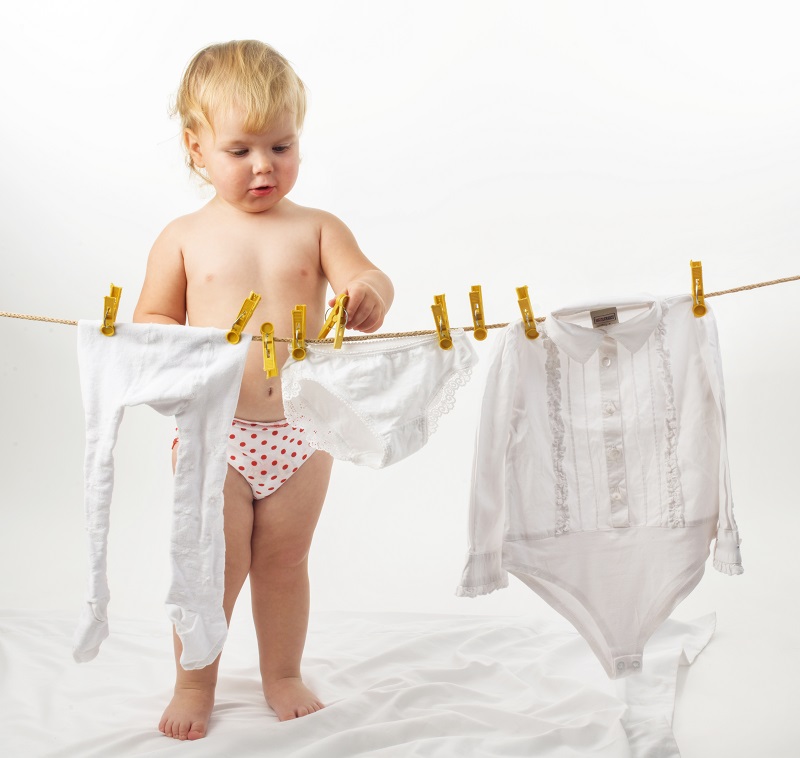Your baby is growing up and starting to want to do things for himself. Are you ready for this burst of enthusiasm?
You have spent the last year or two fetching and carrying for your child: picking up socks, brushing teeth, making meals, putting away plates…. But at some point your child will need to do more himself, both for your sake and for his. How do you manage the transition from doing everything for your child, to encouraging his independence? Unless you want to be washing him into adulthood, you need to introduce him to what he can do for himself, and make it enjoyable.
From the age of 18 months, your toddler will experiment with becoming more independent, toddling off now and then to explore on his own, most happily while you’re sitting firmly rooted to one spot so he knows where you are if he feels scared. Curiosity and the desire for independence tip the balance over his need always to be close to you.
You are more likely now to hear: “No! Me do it!” as your child wants to attempt to do more things for himself. Coming up to three years old, improved coordination and body control mean he is much more capable of doing complex tasks, such as feeding himself, getting undressed, and putting away toys.
Even so, his desire to “help” you and do tasks for himself will most likely outweigh his skills. Your toddler might want to carry his cup of water, but it might not make it to the table without spills every time. He wants to please you, but at the same time wants to assert his ideas and opinions, so while baking seems like a fun activity, washing his hands before and afterward might not be so popular.
It is tempting not to indulge these attempts to join in, especially if you value a tidy home or time is limited, but toddlers love helping, and the discouragement that comes from being passed off or restricted can lead to tantrums, family discord, and a crushed spirit. Offer praise and encouragement, and reign in the urge to do the task more quickly and expertly.
Chores celebrate a child’s accomplishments and help him feel like a full participant in family life.
You might need to reschedule parts of your day to allow more time. Encourage your child’s initiative now and it’s more likely to stick into the preteen years, when children can be incredibly helpful around the home. Your toddler wants to help with the laundry and cooking? Great. It’s what he’s designed to do as a growing toddler, and what he needs to do to develop his motor, emotional, and social skills.
He’s picking up cues from you and his environment and trying to put them into action, and learning how to become part of the world he’s now more aware of.
Being able to accomplish an “adult” task boosts a child’s confidence in mastering the world around him and shows him that independence is achievable rather than scary. It raises his expectations of what he can expect of himself and how he can contribute to family life.
Getting things wrong is inevitable but it builds resilience and the ability to make good judgements, both of which are essential to your child’s psychological well-being when he starts making forays into playgroups and at school. Letting go of a little parental control and allowing your child to explore how things work in a safe way is good for you, too, offering much-needed practice for the years to come. When should you expect children to be capable of helping usefully? That depends on where the child is raised and by whom.
Toddlers of the Kipsigi people in southwestern Kenya are routinely given real household chores from two years old, so that by six they are playing a full role in providing and caring for the family. In villages across India, four-year olds are learning the rudiments of agriculture and girls have domestic chores, having been introduced to the tasks as toddlers with weeding and taking care of siblings.
So what kinds of tasks are good starter activities for this age group? Research suggests these should be achievable: getting undressed and into pajamas, brushing teeth, and tidying toys or putting away crayons.
Toddlers especially like chores involving “grown-up” items: piling laundry into a basket, getting a clean diaper when you’re changing the baby, collecting fallen leaves with a mini rake, and finding the family shoes and lining them up. Are there jobs that he can be in charge of? Expect to supervise every activity at first, and to keep up the reminders, tips, and praise.
Your child will get distracted, and there may be more mess after the chore than before, but there are practical ways to encourage him to help and make the process less work for you—put up a row of hooks at child height for his coat, keep a drawer in the kitchen for his cutlery, and position boxes at an accessible height for tidying up DVDs, blocks, and toys. Research suggests offering to pay pocket money or other rewards doesn’t pay off in the long term.
The best predictor of young adults’ success in their mid-20s was that they participated in household tasks when they were three or four.
Studies suggest that a household routine that includes regular chores strengthens family relationships, makes children feel secure, and leads to increased well-being, which lasts into young adulthood. Chores weave your child into the routines of the household, providing a predictable structure that seems to support early development and a happy family life.
